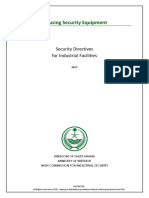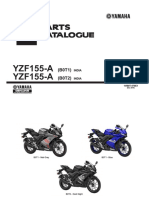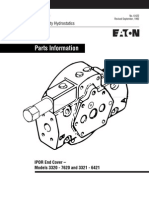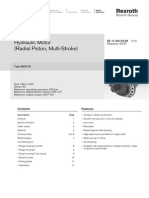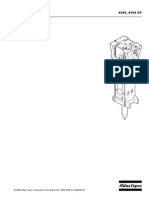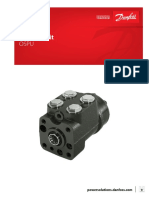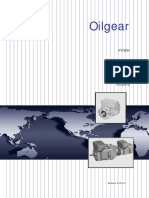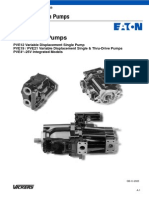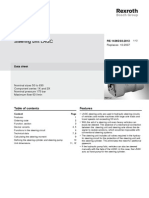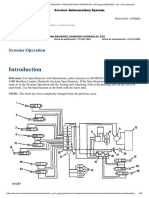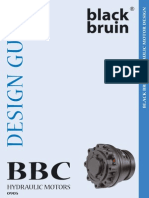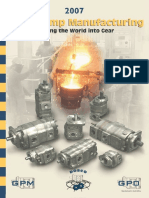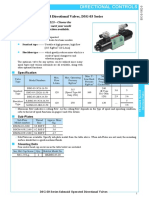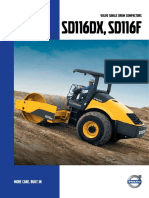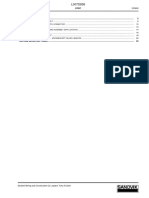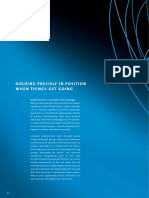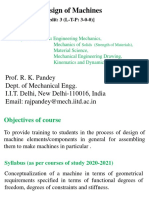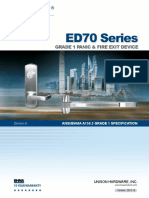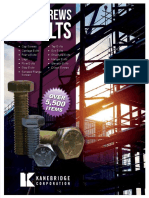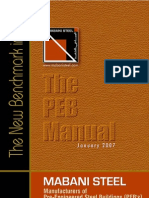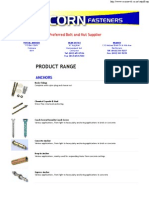Orbit Rol
Orbit Rol
Uploaded by
Fabio MartinsCopyright:
Available Formats
Orbit Rol
Orbit Rol
Uploaded by
Fabio MartinsCopyright
Available Formats
Share this document
Did you find this document useful?
Is this content inappropriate?
Copyright:
Available Formats
Orbit Rol
Orbit Rol
Uploaded by
Fabio MartinsCopyright:
Available Formats
Char-Lynn
Hydraulic Motor
Repair Information
4000 Compact Series Di s c Val ve Gerol er Motor
001
4000 Compact Series Disc Valve Motors
Valve Plate
Seal Splined Drive Wear Seal Plate Geroler
Shaft Face Seal Shaft Seal Bearing Housing Back-up Washer Seal Exclusion Seal Seal Guard Key Bearing and Shaft Assembly
Valve Drive Valve Housing Tie Bolt
Outer Face Seal Seal Valve Balance Ring
Spring
Pin Inner Face Seal
Tools required for disassembly and reassembly. Torque wrench 57Nm [500 lb-in] capacity 300 - 450 mm [12 - 16 inch ]* breaker bar 9/16 socket Small screwdriver 150-200 L x 6,5 W [6-8 L x 1/4 W] blade 3/16 Allen wrench Press Shaft Bullet (600465) 11/4 inch or 32 mm shafts * Unless indicated otherwise, measurements are given in mm [inches]
O-ring/ Plug S/A
** Shaft seal installation tool (600496) 11/4 inch or 32 mm shafts ** Shaft seal installation tool (600421-2) 11/2 inch or 40 mm shafts The following tools are not necessary for disassembly and reassembly, but are extremely helpful.
Alignment studs (2) 200,0 [8.00] Approx. 13,0 [.50] 25,0 [1.00]
8,0 [.312]
9,5 [.375] Dia. Steel Rod 3/8-24 UNF thread Grind flat spots on each side
4000 Compact Series Disc Valve Motors
Disassembly
Alignment studs (2) Cleanliness is extremely important when repairing a hydraulic motor. Work in a clean area. Before disconnecting the lines, clean the port area of the motor thoroughly. Use a wire brush to remove foreign material and debris from around the exterior joints of the motor. Check the shaft and key slot, remove all nicks, burrs or sharp edges that might damage the bearing housing seals when installing the shaft that you keep the motor in the vise during disassembly and reas-
Figure 3
sembly. Follow the clamping procedures explained throughout the manual.
Figure 1
and bearing assembly. Before starting the disassembly procedures, drain the oil from inside the motor. 1 Place the motor in a vise with the output shaft down. Clamp across the mounting flange of the motor not the housing. Excessive clamping pressure will cause distortion. When clamping, use some protective device on the vise, such as special soft jaws, pieces of hard rubber or board. Although not all drawings show the motor in a vise, we recommend
Seal
Seal
Figure 4
Case Drain Plug
2 Remove 4 bolts from motor. 3 Lift valve housing straight up. If done carefully the pins, springs, balance ring assembly, and valve will remain on the valve plate. 4 Carefully remove 76,0 [3.00] diameter seal from valve housing.
Tie Bolts
5 Remove case drain plugwith seal, from valve housing. 6 Remove 2 pins and 2 springs from balance ring assembly, see Figure 5.
Figure 2
4000 Compact Series Disc Valve Motors
Disassembly
Outer Face Seal
15 Remove the 76,0 [3.00] diameter seal from wear plate, see Figure 7.
Bearing Housing
Seal
Wear Plate
Pin (2) and Spring (2) Inner Face Seal Valve Balance Ring
Figure 8 16 Remove the wear plate. 17 Remove the shaft face seal from the wear plate. 18 Remove the 76,0 [3.00] diameter seal from bearing housing.
Shaft Face Seal
Figure 5 7 Remove balance ring assembly. 8 Remove inner and outer face seals from balance ring. 9 Remove the valve.
Valve Drive
Bearing Housing
Seal
Figure 6
Valve Plate
Figure 9
Shaft and Bearing Assembly
19 You may need a press to remove shaft and bearing assembly from bearing housing. (Key must be removed before removing shaft.) 10 Remove the valve plate. 11 Remove the 76,0 [3.00] diameter seal from valve plate. 12 Remove the valve drive.
Bearing Housing Exclusion Seal
Shaft Seal
Seal
Back-up Washer
Seal
Geroler
Figure 10
Figure 7 13 Remove the Geroler. Be sure to retain the rollers in the outer ring if they are loose. 14 Remove the drive.
20 Use a small screwdriver to remove shaft seal, back-up washer and exclusion seal from bearing housing, see Figure 10. Do not damage bore of housing. Note: Individual parts of shaft and bearing assembly are not sold separately. Replace as a unit.
4000 Compact Series Disc Valve Motors
Reassembly
Check all mating surfaces. Replace any parts that have scratches or burrs that could cause leakage. Clean all metal parts in clean solvent. Blow dry with air. Do not wipe dry with cloth or paper towel because lint or other matter can get in the hydraulic system and cause damage. Do not use a coarse grit or try to file or grind these parts. Check around the keyway and chamfered area of the shaft for burrs, nicks or sharp edges that can damage the seals when reassembling the bearing housing. Note: Lubricate all seals (prior to installation) with petroleum jelly such as Vaseline. Use new seals when reassembling this motor. Refer to parts list (6-129) for proper seal kit number. 21 Use a press to install exclusion seal in outer bore of bearing housing. Lip of seal must face outward. See Figure 11. If a press is not available use a plastic or rubber hammer, being careful not to damage or cock seal in the bore. 26 Alignment studs can be very helpful in reassembly of the motor. See special tool listing page 2. If you use studs, install 2 studs diagonally opposed in the bearing housing. 27 Install the shaft face seal in the wear plate as shown in Figure 11. Do not distort seal. 28 Install the wear plate, see Figure 11. 29 Apply a light film of petroleum jelly to the 76,0 [3.00] diameter seal and install seal in the wear plate. 30 Install the drive into the output shaft. 31 Align the notch on the outside of the Geroler with the notch on the wear plate. Install the Geroler against the wear plate. Be sure to retain the rollers in the outer ring if they are loose. 32 Install the valve drive in the Geroler. Note: Installation at this time involves 3 steps in the timing of the motor. Timing determines the direction of rotation of the output shaft. Timing parts include: 1. Geroler Shaft Face Seal 2. Valve Drive 3. Valve Plate 4. Valve Wear Plate
Shaft Face Shaft Seal
Back-up Washer* Exclusion Seal Seal
Geroler Valve Plate Valve Drive Valve Rotate Valve Clockwise 1/2 tooth max. to Engage Spline
* Note: High pressure
shaft seal (14857-001) does not use the back-up washer
Shaft and Bearing Assembly
Drive
Figure 11 22 Place back-up washer into seal bore. Place shaft seal onto installation tool (600496) 11/4 inch or 32 mm shafts or (00000) 11/2 inch 40 mm shafts and press seal into seal bore of the housing. 23 Clamp housing in vise, see Figure 1. 24 Place protective bullet (see note below) over shaft. Apply petroleum jelly to inside diameter of dust and shaft seal. You may need a press to install shaft and bearing assembly. Do not distort shaft seal. Damage to this seal will cause leakage. Note: Bullet (600465) for 11/4 inch or 32 mm shafts, by special order. 25 Apply small amount of petroleum jelly to the 76,0 [3.00] diameter seal. Install seal into the bearing housing.
Largest Open Pocket Alignment Ref. Only
Anyone of 6 Ports Open to Ouside of Vave
Figure 12 Timing Alignment
Timing Step # 1 Locate the largest open pocket in the Geroler and mark it on the outside edge of the Geroler. 33 Apply a light film of petroleum jelly to the 76,0 [3.00] diameter seal. Install seal in groove of valve plate.
4000 Compact Series Disc Valve Motors
Reassembly
34 Align the notch on the outside of the valve plate with the notch on the Geroler as shown in Figure 12. Timing Step # 2 Locate the slot opening in the valve plate which is in line with the largest open pocket of the Geroler. Timing Step # 3 Locate any one of the side openings of the valve and align this opening with the open slot of the valve plate that is in line with the largest open pocket of the Geroler. Install the valve by rotating it clockwise until the spine teeth engage (1/2 spine tooth max.). This will provide the proper rotation when pressurized as shown in Figure 13. Important: Install face seals in the positions shown in Figure 15, or the motor will not operate properly. Do not force or bend the face seals. Any damage to these seals will affect the operation of the motor.
Outer Seal Inner Seal Pin Notch
Balance Ring
Figure 15
38 Align pin notches in balance ring with pins in bore of valve housing. Install balance ring assembly in valve housing.
Clockwise Rotation Counter Clockwise Rotation
Figure 13
Balance Ring
Valve Housing
Figure 16
Spring and Pin
Seal
Valve Housing
Alignment Studs
Figure 14
Valve Plate
35 Install 2 springs and 2 pills in the holes located in the bore of the valve housing, as shown in Figure 14. 36 Apply a light film of petroleum jelly to the 76,0 [3.00] diameter seal. Install seal in the valve housing. 37 Apply petroleum jelly to inner and outer face seals. Install seals on balance ring as shown in Figure 15.
Figure 17
39 Insert your finger through port of valve housing. Apply pressure to side of balance ring as shown in Figure 16. Hold ring in position until valve housing is in place against valve plate (see Figure 17). Note: After installing the valve housing on the valve plate check for proper placement. Push down on the valve housing. You should get a slight spring action.
4000 Compact Series Disc Valve Motors
Reassembly
40 Install tie bolts. If you use alignment Studs, install 2 bolts opposite the studs. Finger tighten the bolts. Remove the alignment studs and replace with the two remaining bolts. Torque all four bolts alternately to 50 Nm [450 lb-in]. 41 Install seal on case drain plug then install in valve housing. Torque to 6 Nm [50 lb-in.] Figure 18
Tie Bolts Case Drain Plug with Seal
Wheel Motor
Shaft Seal Bearing Housing
Shaft and Bearing Assembly
Shaft Face Seal Castle Nut Back-up Washer
Seal Exclusion Seal
Bearing Housing
Figure 19
Exclusion Seal
On wheel motors, a different bearing housing is used, see Figure 19. Other than this the same parts are the same as the standard motor and the same disassembly and reassembly procedures apply.
Seal Guard
Seal Guard Flush with Flange Face
Wheel Motor with Seal Guard
Installation of Seal Guard: After completing assembly of the shaft and bearing assembly into the bearing housing, press the seal guard onto the shaft with a tool that will provide an even push over the seal. This tool must bottom out against the bearing housing and provide a 4,5 mm [.177 inch] stop for the seal guard.
4000 Compact Series Disc Valve Motors
Bearingless Motor
Seal Flange
This motor is the same as the standard motor without the shaft/ bearing assembly, and bearing housing. The mounting flange replaces the bearing housing, see Figure 20. Follow same disassembly and reassembly procedures as rear section of standard motor.
Seal
Figure 20
Disassembly Reassembly Shuttle Valve Option
Disassembly of shuttle valve option, this valve is located in the valve housing. Clean and inspect shuttle valve parts and reassemble with new seals, torque plugs to 8-11 Nm [75-100 lb-in].
O-ring/Plug S/A Spring Shim(s) Poppet
Torque to 8-11 Nm [75-100 lb-in] Low Pressure Relief Valve
O-ring/Plug S/A Spring Shim(s) Poppet End Ports End Port Case Drain
Staggered Ports Case Drain
Dash Pot Piston Spring
Shuttle Vsalve Piston Spring
Dash Pot
Poppet Dash Pot O-ring/Plug S/A
O-ring/Plug S/A Torque to 8-11 Nm [75-100 lb-in] Spring Poppet Shuttle Vave Option
Poppet Dash Pot O-ring/Plug S/A
O-ring/Plug S/A Torque to 8-11 Nm [75-100 lb-in] Spring Poppet Shuttle Vave Option
Figure 21
4000 Compact Series Disc Valve Motors
Reassembly Speed Sensor
1 Rotate the motor shaft until a (gear/target) tooth is centered in the speed sensor port. If this is not done, the sensor may be damaged during the operation of the motor. 2 Make sure the lock nut and its threads are clean and dry for the proper torque. Position the lock nut against the alignment nut as shown in Figure 22. 3 Move the washer and the o-ring up against the speed sensor body threads as shown in Figure 22. 4 By hand, lightly thread the speed sensor body into the housing until the sensor touches against the motor (gear/target) tooth. Do not force the sensor against the (gear/ target) tooth, damage may occur. Make sure the o-ring or the washer do not touch the housing see Figure 23. 5 Turn the speed sensor body out one quarter turn (CCW) plus the additional amount (CCW) needed to make the alignment notches perpendicular to the motor shaft centerline (90 +/-5 degrees from the motor shaft centerline Figure 24 and 25). 6 Maintain the speed sensor body alignment (Figure 25), and tighten the lock nut to 8,5-14 Nm [75-125 lb-in.] (torque values are for clean dry threads). 7 Check the speed sensor body for correct alignment (Figure 25), reinstall the sensor if it is not correct. Alignment Notch Alignment Notchs Perpendicular to Centerline of Motor Figure 22
Speed Sensor Installation
Speed Sensor Body Alignment Nut Lock Nut Washer O-ring Speed Sensor Port Figure 23
Housing
Gear/Target Tooth
Alignment Notch
haft ith otor S w l M e ll f Para erline o t n e C Alignment Nut
Figure 24
90
Figure 25
9/16 inch
Hex Head
Back out
Lock Nut
11/16 inch
Hex Head
Alignment Notch
4000 Compact Series Disc Valve Motors
Reassembly Quadrature Speed Sensor
1) Rotate the motor shaft until a (gear/target) tooth is centered in the speed sensor port. If this is not done, the sensor may be damaged during the operation of the motor. 2) Make sure the lock nut and its threads are clean and dry for the proper torque. Position the lock nut against the alignment nut as shown in Figure 1. 3) Move the washer and the o-ring up against the speed sensor body threads as shown in Figure 1. 4) By hand, lightly thread the speed sensor body into the housing until the sensor touches against the motor (gear/target) tooth. Do not force the sensor against the (gear/target) tooth, this might damage the sensor. Make sure the o-ring and the washer are not touching the housing, see Figure 2. 5) Back out the speed sensor body one half turn (CCW) plus the additional amount (CCW) needed to make the sensor alignment notch point to your right (when viewing from the shaft end of the motor). The speed sensor must be backed out (turned CCW) from the (gear/target) tooth no more than a turn and a half (540 degrees) total. The sensor alignment notch should be perpendicular to the motor shaft +/- 5 degrees (Figure 3 and 4). To verify that the speed sensor is installed properly, review the following steps: A) Imagine holding the motor shaft in your hand with the end of the motor pointing away from your body. B) Rotate the motor such that the speed sensor is pointing straight up. C) The alignment notch should be pointing directly to your right. D) The sensor alignment notch should be perpendicular to the motor shaft centerline +/- 5 degrees. 6) Maintain the speed sensor body alignment (Figure 4) and tighten the lock nut to 8,5 - 14 Nm [75-125 lbin]. Torque values are for clean dry threads. 7) Check the speed sensor body for correct alignment (Figure 4) and reinstall the sensor if it is not correct.
Speed Sensor Installation
Speed Sensor Body Alignment Nut Lock Nut Alignment Notch Washer O-ring
Figure 1
Speed Sensor Port
Figure 2
Housing
Gear/Target Tooth
Alignment Notch
Figure 4
Alignment Nut
Sh tor with llel e of Mo a r a n P erli t Cen
aft
Port End
Figure 3
5/8 inch
Hex Head Alignment Notch 90 Back out Shaft End Perpendicular to Centerline of Motor
Lock Nut
3/4 inch
Hex Head
10
4000 Compact Series Disc Valve Motors
Product Identification
For Additional Literature Contact Eaton Hydraulics 14615 Lone Oak Road Eden Prairie, MN 55344. Specifications and performance data, Catalog 11-01-113 Replacement part numbers and kit information Parts Information 06-01-168
Char-Lynn
Date
Eaton Hydraulics Eden Prairie, MN 55344
Product Number
How to Order Replacement Parts Each Order Must Include the Following:
1. Product Number 2. Date Code 3. Part Name 4. Part Number 5. Quantity of Parts
000 0000 000
Product Line Identification Number Product Identification Number Engineering Change Code
11
Eaton Fluid Power Group Hydraulics Business USA 14615 Lone Oak Road Eden Prairie, MN 55344 USA Tel: 952-937-9800 Fax: 952-294-7722 www.eaton.com/hydraulics
Eaton Fluid Power Group Hydraulics Business Europe Route de la Longeraie 7 1110 Morges Switzerland Tel: +41 (0) 21 811 4600 Fax: +41 (0) 21 811 4601
Eaton Fluid Power Group Hydraulics Business Asia Pacic 11th Floor Hong Kong New World Tower 300 Huaihai Zhong Road Shanghai 200021 China Tel: 86-21-6387-9988 Fax: 86-21-6335-3912
2009 Eaton Corporation All Rights Reserved Printed in USA Document No. C-MOLO-TS029-E Supersedes 07-01-160 March 2009
You might also like
- KTV - Installation - KTV Flex DirectDocument120 pagesKTV - Installation - KTV Flex DirectanisiobinzubechiNo ratings yet
- Daelim S3Document79 pagesDaelim S3أنطونيو ماركو0% (1)
- H1 ManualDocument14 pagesH1 ManualJonatan Condo IbarraNo ratings yet
- SEC - 09 - Structures Housing Security EquipmentDocument18 pagesSEC - 09 - Structures Housing Security EquipmentAnonymous bKp9kE0DYNo ratings yet
- YZF155-A YZF155-A: IndiaDocument75 pagesYZF155-A YZF155-A: IndiaadsfsdfgNo ratings yet
- Hobart Model 5216 Meat SawDocument23 pagesHobart Model 5216 Meat Sawogrench100% (1)
- Sirius Instructions 2 PDFDocument64 pagesSirius Instructions 2 PDFanthony dizonNo ratings yet
- Design Cleat and Vertical PlateDocument10 pagesDesign Cleat and Vertical PlateSheik Mohamed Liakath100% (2)
- Fatigue Failure of BoltsDocument2 pagesFatigue Failure of Boltskkaranag100% (1)
- C Molo TM003 eDocument8 pagesC Molo TM003 ejcclaNo ratings yet
- H1 045-053 Tandem Pumps - Service Manual - 520L0928 - Rev AD - May 2008Document48 pagesH1 045-053 Tandem Pumps - Service Manual - 520L0928 - Rev AD - May 2008Jose Manuel Barroso PantojaNo ratings yet
- Hydraulic Pump Regulator Test and Adjustment-Maximum Flow-200CLCDocument2 pagesHydraulic Pump Regulator Test and Adjustment-Maximum Flow-200CLCLupin Gonzalez100% (1)
- Bombas de Pistones PVEDocument30 pagesBombas de Pistones PVEMario Alvarado TapiaNo ratings yet
- A08974e PDFDocument44 pagesA08974e PDFComassur SA de CVNo ratings yet
- Service Manual 300050007500 PermconDocument19 pagesService Manual 300050007500 PermconMiguel Angel Santos PintadoNo ratings yet
- Group 5 Swing Device (Type 2) : 1. Removal and Install of MotorDocument33 pagesGroup 5 Swing Device (Type 2) : 1. Removal and Install of MotorTaha RdmanNo ratings yet
- Hydraulic BrakesDocument65 pagesHydraulic BrakesFausto ArmijosNo ratings yet
- HL 750 7-1Document2 pagesHL 750 7-1REMZONA100% (1)
- Eaton: Parts InformationDocument2 pagesEaton: Parts InformationFernando SabinoNo ratings yet
- Re15205 02-98Document12 pagesRe15205 02-98Timon2005100% (1)
- Series 45 Frame F Open Circuit Axial Piston Pumps: Repair InstructionsDocument28 pagesSeries 45 Frame F Open Circuit Axial Piston Pumps: Repair InstructionsJose Manuel Barroso PantojaNo ratings yet
- Regulation Pompe Sauer Danfos Series 90Document2 pagesRegulation Pompe Sauer Danfos Series 90ezeazeazeaeNo ratings yet
- Desarmado Bomba 416Document16 pagesDesarmado Bomba 416Anword TelefonosNo ratings yet
- Re15206 2009-07 PDFDocument18 pagesRe15206 2009-07 PDFВладиславМасарскийNo ratings yet
- Motores Hidraulicos EATON Varios ModelosDocument75 pagesMotores Hidraulicos EATON Varios ModelosPalestina YanNo ratings yet
- Procedimiento de Prueba de Banco para Bombas de Pistón Hidráulicas (0599, 5070, 5070) CaterpillarDocument28 pagesProcedimiento de Prueba de Banco para Bombas de Pistón Hidráulicas (0599, 5070, 5070) Caterpillarcalvarez alvarezNo ratings yet
- Servodirectii OrbitaleDocument12 pagesServodirectii OrbitaleIonescu AngelNo ratings yet
- Spare Parts List: Hydraulic BreakerDocument36 pagesSpare Parts List: Hydraulic Breakervitor santosNo ratings yet
- Cross Valve Directional ControlDocument36 pagesCross Valve Directional ControlariwibowoNo ratings yet
- Steering Unit: Service ManualDocument28 pagesSteering Unit: Service ManualmusafirNo ratings yet
- 510B Backhoe Loader: Engine PerformanceDocument5 pages510B Backhoe Loader: Engine Performancebalajimettur100% (1)
- S-Series General Purpose Motors: Parts and Repair ManualDocument14 pagesS-Series General Purpose Motors: Parts and Repair ManualJuan Manuel PiccoliNo ratings yet
- OILGEAR-PVWH BombaDocument22 pagesOILGEAR-PVWH BombaDiego CamachoNo ratings yet
- VP1 Service ParkerDocument16 pagesVP1 Service ParkerAdrian Alonso Bustos GonzalezNo ratings yet
- Variable Displacement Pumps - A10V (S) O & (A) A10VSO (Series 31)Document35 pagesVariable Displacement Pumps - A10V (S) O & (A) A10VSO (Series 31)Andie Kesuma100% (1)
- Electro Valvulas TitanDocument4 pagesElectro Valvulas TitanAlvaro Escalona GtzNo ratings yet
- Eaton Hidraulic PumpsDocument28 pagesEaton Hidraulic Pumpspecirepi100% (1)
- Wheel Horse Hydraulic Lift Valve & Cylinder Repair ManualDocument12 pagesWheel Horse Hydraulic Lift Valve & Cylinder Repair ManualwordswainNo ratings yet
- Unidades Direção Rexroth PDFDocument12 pagesUnidades Direção Rexroth PDFmegatornadoNo ratings yet
- Differential and Bevel Gear 966 InstallDocument14 pagesDifferential and Bevel Gear 966 InstallAlan GonzalezNo ratings yet
- Char Lynn 2kDocument34 pagesChar Lynn 2kJas Sum100% (1)
- Caterpillar Cat 329DL EXCAVATOR (Prefix JHJ) Service Repair Manual (JHJ00001 and Up) PDFDocument24 pagesCaterpillar Cat 329DL EXCAVATOR (Prefix JHJ) Service Repair Manual (JHJ00001 and Up) PDFfkdmmaNo ratings yet
- Torque Specification: Service Specifications Engine MechanicalDocument2 pagesTorque Specification: Service Specifications Engine MechanicalIslam AttiaNo ratings yet
- Transaxle Assembly, Power Shuttle, Reverse ClutchDocument3 pagesTransaxle Assembly, Power Shuttle, Reverse ClutchNeftali FuentesNo ratings yet
- Bomba Hidraulica SKFDocument84 pagesBomba Hidraulica SKFJůan LópežNo ratings yet
- BOMAG Light Tandem Rollers BOMAG Light Combination Rollers: BW 115 AD-3 & BW 131 AD-3 BW 115 AC-3 & BW 131 ACW-3Document12 pagesBOMAG Light Tandem Rollers BOMAG Light Combination Rollers: BW 115 AD-3 & BW 131 AD-3 BW 115 AC-3 & BW 131 ACW-3JAMALUDINNo ratings yet
- 416B Páginas 1 2Document2 pages416B Páginas 1 2jose hurtadoNo ratings yet
- Steering Cylinder ( - 618133) - ST156245: Parts ListDocument3 pagesSteering Cylinder ( - 618133) - ST156245: Parts ListtallerNo ratings yet
- BBC DesignGuideDocument28 pagesBBC DesignGuideJosé Emilio D' LeónNo ratings yet
- Repair Manual: Series 45 K and L Frame Open Circuit Axial Piston PumpsDocument28 pagesRepair Manual: Series 45 K and L Frame Open Circuit Axial Piston PumpsJose Manuel Barroso PantojaNo ratings yet
- Engine Serial Number Plate: Specialty Engine Catalog For Sugar Cane Harvester (6081Ht801/Ht802)Document103 pagesEngine Serial Number Plate: Specialty Engine Catalog For Sugar Cane Harvester (6081Ht801/Ht802)marioNo ratings yet
- Korota Brochure EngDocument5 pagesKorota Brochure EngKorotaSANo ratings yet
- 200942315249490Document56 pages200942315249490Miranda Davila ArleyNo ratings yet
- 2-Latest EIC-E-1002-0 (DSG-03 Series Solenoid Operated Directional Valves)Document12 pages2-Latest EIC-E-1002-0 (DSG-03 Series Solenoid Operated Directional Valves)Sujeet KumarNo ratings yet
- Manual Reparacion Alzadora 2254 (2000)Document304 pagesManual Reparacion Alzadora 2254 (2000)ERMINSUL VICUÑA SALAS100% (1)
- Service Manual PGP030/031 Series PGP050/051 Series: Effective: August 2002 Supersedes: June 1989Document16 pagesService Manual PGP030/031 Series PGP050/051 Series: Effective: August 2002 Supersedes: June 1989sssydorenkoNo ratings yet
- Rcoa1806 03 03Document36 pagesRcoa1806 03 03Fernando Sabino100% (1)
- Transmission Hydraulic Control ValvesDocument7 pagesTransmission Hydraulic Control ValvesDarío Ache EmeNo ratings yet
- 005 Joystick 2Document8 pages005 Joystick 2JonathanDavidDeLosSantosAdornoNo ratings yet
- Bowex enDocument32 pagesBowex enTimon2005No ratings yet
- Eaton EN-0201 ® Hydraulic MotorDocument8 pagesEaton EN-0201 ® Hydraulic Motormemelo3100% (1)
- Doble Reduccion 70-380Document2 pagesDoble Reduccion 70-380Zamir Andres SencioNo ratings yet
- HMF Data and Specifications PDFDocument5 pagesHMF Data and Specifications PDFxxsh100% (2)
- SD116DX, SD116f: Volvo Single Drum CompactorsDocument4 pagesSD116DX, SD116f: Volvo Single Drum Compactorsroyreid99No ratings yet
- A17fo PDFDocument16 pagesA17fo PDFdivortiareNo ratings yet
- 07-124 Motor CharlynDocument12 pages07-124 Motor CharlynMiguel Angel Santos Pintado100% (2)
- Motor Eaton 1000 A PartsDocument12 pagesMotor Eaton 1000 A PartsJuan Hernan Valdiviezo DiasNo ratings yet
- Service Bulletin Trucks: Unit Injectors, ReplacementDocument23 pagesService Bulletin Trucks: Unit Injectors, Replacementbaby100% (1)
- 7 CabinDocument24 pages7 CabinNick Torres NeyraNo ratings yet
- 1 Part 1 Catalogue en LocknutDocument22 pages1 Part 1 Catalogue en Locknutehtisham khanNo ratings yet
- Pins and BushingsDocument6 pagesPins and BushingsYuriPasenkoNo ratings yet
- Lathe 9x20 Thread ChartDocument4 pagesLathe 9x20 Thread ChartRC VilledaNo ratings yet
- Ilovepdf Merged PDFDocument1,064 pagesIlovepdf Merged PDFShashank DammalapatiNo ratings yet
- Sega Lindbergh Universal CabinetDocument88 pagesSega Lindbergh Universal CabinetMartin FeNo ratings yet
- Building A CNC Router: About This Instructable 473,771 2,348Document37 pagesBuilding A CNC Router: About This Instructable 473,771 2,348Rizwan Akram RizwanNo ratings yet
- Grade 1 Panic & Fire Exit Device: Ansi/Bhma A156.3 Grade 1 SpecificationDocument12 pagesGrade 1 Panic & Fire Exit Device: Ansi/Bhma A156.3 Grade 1 Specificationherbert laraNo ratings yet
- 2576 PDFDocument256 pages2576 PDFEd CalheNo ratings yet
- Manual Rosq - enDocument10 pagesManual Rosq - enRobinson JimenezNo ratings yet
- One-Way Flow Control Valve VFOF-LE-BAH-G14-Q8: Data SheetDocument1 pageOne-Way Flow Control Valve VFOF-LE-BAH-G14-Q8: Data Sheethector vasquezNo ratings yet
- NotesDocument1 pageNotessatydevsinghnegiNo ratings yet
- Bolts: Cap ScrewsDocument8 pagesBolts: Cap Screwsjairo F. Arroyo MNo ratings yet
- Transmission Line Design-Advanced TADP 640: Steel Poles-Design Considerations - Miscellaneous Topics Dr. Prasad YenumulaDocument40 pagesTransmission Line Design-Advanced TADP 640: Steel Poles-Design Considerations - Miscellaneous Topics Dr. Prasad YenumulakhanhnguyenNo ratings yet
- Asesoris Well HeadDocument18 pagesAsesoris Well HeadLaurentius PramonoNo ratings yet
- Grupo 11 EngineDocument91 pagesGrupo 11 EngineJunior de CantilloNo ratings yet
- Mabani Technical ManualDocument286 pagesMabani Technical ManualJennefer Reyes100% (11)
- FISHER - ffs2b4 - ZINCODocument18 pagesFISHER - ffs2b4 - ZINCOJonhy FishermanNo ratings yet
- Maintenance Tools and Fasteners MCQDocument6 pagesMaintenance Tools and Fasteners MCQshlok shrivastavaNo ratings yet
- Acorn Catalogue-FastenerDocument15 pagesAcorn Catalogue-FastenerMani Maran0% (1)
- Caterpillar Cat M318C WHEELED Excavator (Prefix BCZ) Service Repair Manual (BCZ02001 and Up) PDFDocument26 pagesCaterpillar Cat M318C WHEELED Excavator (Prefix BCZ) Service Repair Manual (BCZ02001 and Up) PDFfkdmmaNo ratings yet
- Screw Gauge Booklet PDFDocument133 pagesScrew Gauge Booklet PDFRamanan KumarNo ratings yet



